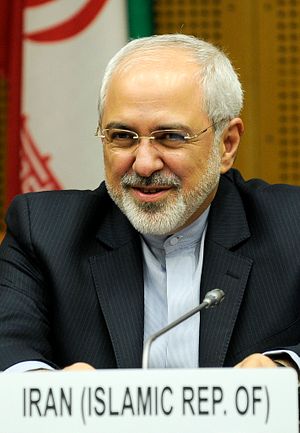Iran’s foreign minister, Javad Zarif, will visit China on September 15, the Chinese Foreign Ministry announced on Friday. It will be Zarif’s first visit to China since the successful negotiation of a deal on Iran’s nuclear program between Iran and the P5+1 countries (China, France, Germany, Russia, the United Kingdom, and the United States) in July.
Chinese Foreign Ministry spokesperson Hong Lei said Chinese leaders hope to discuss “deepening China-Iran relations and enhancing all-round cooperation under the new circumstances,” a reference to the Joint Comprehensive Plan of Action (JCPOA), which calls for the lifting of sanctions on Iran in exchange for limits on the country’s nuclear program. Hong also said Zarif and Chinese officials would discuss the implementation of the agreement.
China has been looking forward to a post-sanctions Iran since negotiations first began in 2013. China began upping its imports of Iranian oil in 2014, and received a delegation of Iranian oil officials back in April, before the JCPOA was even finalized. According to Fars News, Iran is currently China’s third largest oil supplier, accounting for around 12 percent of China’s annual consumption.
Iran is just as eager to up its trade with China. Iran’s ambassador to China, Ali Asqar Khaji, pointed out to Fars News that China-Iran trade from March 21, 2014 (the Iranian New Year) to January 22, 2015 was worth $52 billion — up 30 percent over the same period the previous year.
But trade aside, Iran stands to play a crucial role in China’s larger foreign policy strategy. It occupies a key point on the planned Silk Road Economic Belt – China’s vision for an overland trade route and integrated economic zone stretching from western China to Europe. Open Iranian participation in such a massive international project would have been unthinkable prior to 2013, when Iran and the P5+1 grouping announced a breakthrough in their negotiations. But with a roadmap in place for lifting international sanctions on Tehran, China is eager to bring its plans into fruition.
That’s also why China has welcomed Iran to join it in multinational organizations, from the new Asian Infrastructure Investment Bank (of which Iran is a founding member) to the Shanghai Cooperation Organization (SCO). While Iran cannot officially join the SCO until it is free from UN sanctions, it has been active as an observer state. President Hassan Rouhani even traveled to Ufa, Russia, to attend this year’s SCO summit and the BRICS summit. Press TV reported at the time that a Russian official said Iran’s membership application “will be granted” as soon as the sanctions are lifted.
China is not the only country eager to deepen ties with Iran now that the JCPOA has legitimized such cooperation. Pakistan and India, for instance, are also ready to strengthen partnerships with Tehran. Zarif visited both Islamabad and New Delhi in August.

































